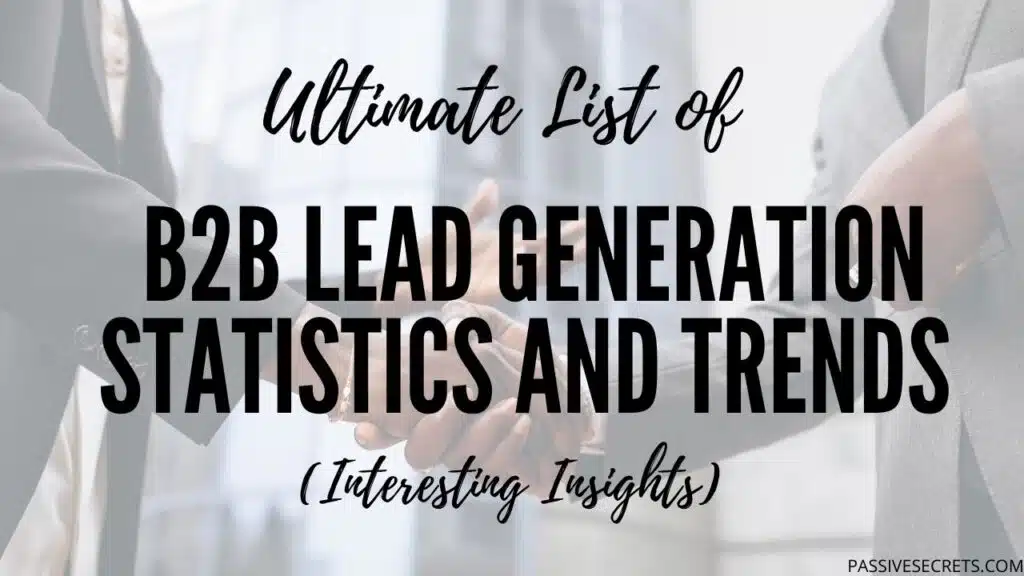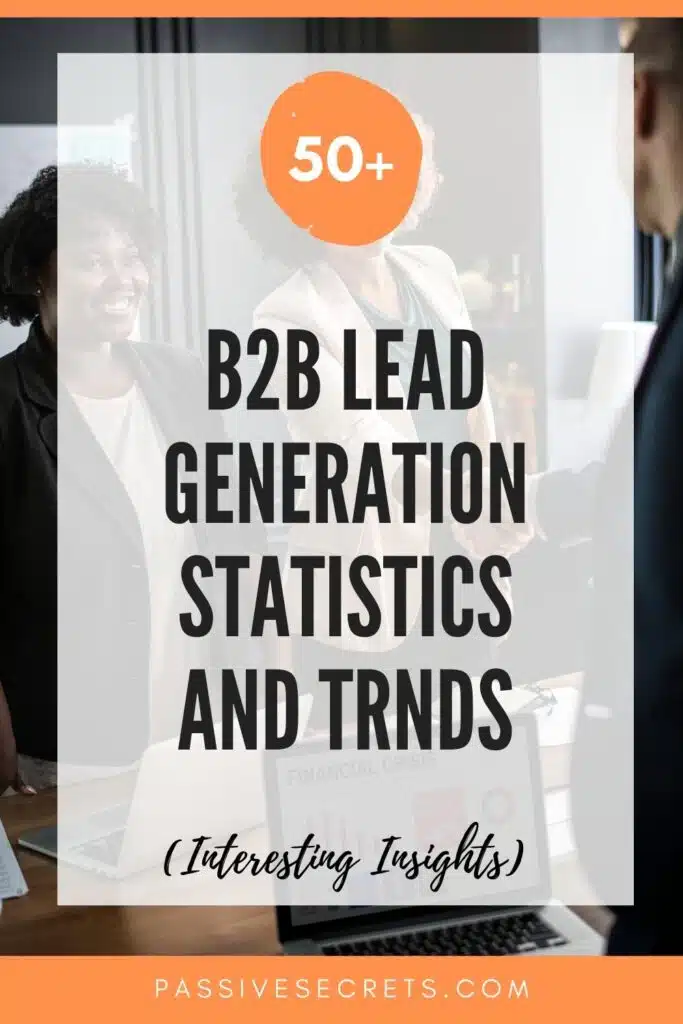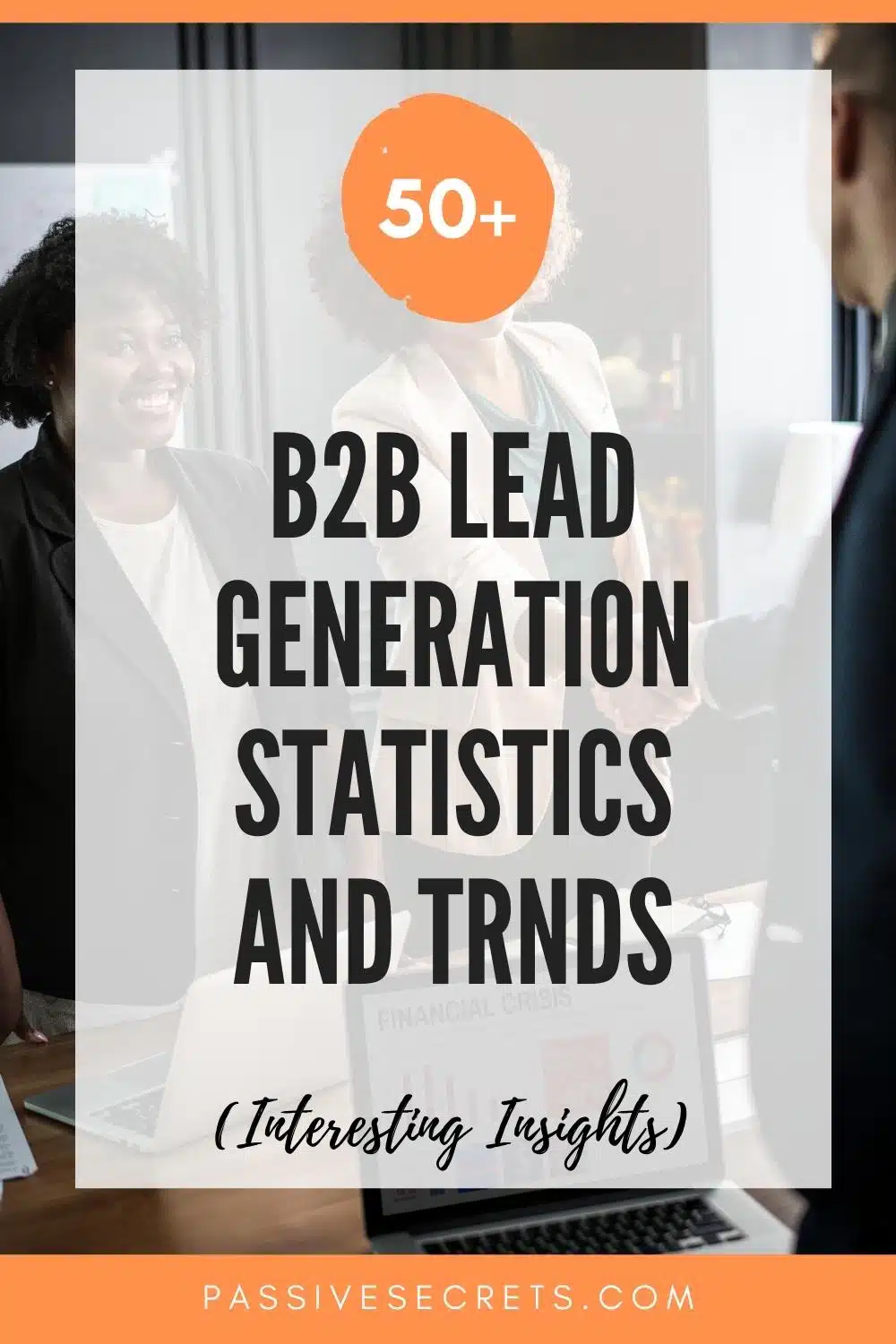
Did you know that over 85% of B2B marketers use content to generate leads, compared to just 60% of B2C marketers? This highlights the importance of content in B2B marketing.
Also, most B2B companies (68%) use landing pages to help turn new leads into customers.
Understanding B2B lead generation is crucial for any business looking to grow. However, it takes work. 68% of B2B businesses struggle with lead generation.
But what if you could consistently crack the code to attract and convert high-quality leads?
In this article, we’ll dive into the latest B2B lead generation statistics, revealing surprising trends, actionable insights, and data-driven strategies to help you stay ahead of the competition and fuel your business growth.
Key B2B Lead Generation Statistics & Facts (Editor’s Pick)
General B2B Lead Generation Facts & Statistics
1.US B2B advertising and marketing spending reached $59.5 billion in 2024 and is expected to surpass $69 billion by 2026, growing by nearly $10 billion in just two years. (source)
2. US online B2B advertising and marketing spending hit $20.4 billion in 2024 and is forecasted to rise to $27 billion by 2026, a gain of $6.6 billion in just two years. (source)
3. The global B2B lead generation services market is booming, expanding from $2.4 billion in 2023 to a projected $6.5 billion by 2032, with a remarkable 11.8% annual growth rate. The global B2B lead generation services market is divided into regions: Asia Pacific, North America, Latin America, Europe, and the Middle East & Africa. (source)
4. 58% of surveyed B2B businesses aim to generate over 1,000 online leads monthly, indicating a strong desire for high-volume lead generation. (source)
5. B2B companies spend 36% of their marketing budget on lead gen, compared to 32% for mainstream companies. (source)
6. In 2023, North America had a significant share of the B2B lead generation services market. This was due to the region’s advanced digital infrastructure, strong investments in technology, and many leading tech companies. The United States, as a major center for B2B commerce, led the way in adopting lead generation services and driving market growth. (source)
B2B Lead Generation Benchmarks and Conversion Rates
7. A July 2023 survey found that 43% of B2B marketers plan to boost their content marketing spend in the next 12 months, with 13% aiming to increase it by over 9%. (source)
8. The US B2B trade show market is recovering, reaching $15.78 billion in 2024 and surpassing pre-pandemic levels. The market is expected to grow, hitting $17.3 billion by 2028. (source)
9. US offline B2B advertising and marketing spending reached $39.1 billion in 2024 and is expected to rise to $42 billion by 2026, a steady increase over the next two years. (source)
10. The US manufacturing industry’s B2B e-commerce sales surged 15% in 2022, reaching $623 billion, up from $543 billion in 2021, marking a significant growth in digital sales. (source)
11. 57% of B2B marketers say they have used “quantity of leads” as a metric to track content performance in the past 12 months. 52% reported using “quality of leads” for the same purpose. (source)
12. 60% of B2B marketers say they rely most on the “quality of leads” as a metric when evaluating content performance. 34% reported the same for the “quantity of leads.” (source)
13. Top-performing B2B companies generate high-quality leads at a 2.5x higher rate, boosting ROI. (source)
14. B2B leaders are more likely than mainstream companies to rate their lead gen capabilities as excellent, especially in:
15. US B2B marketers’ marketing technology spending rose 12.7% in 2023, hitting $7.68 billion, and is predicted to exceed $8.7 billion in 2024, continuing an upward trend. (source)
16. US B2B marketing data spending is expected to rise 2.5% in 2024, reaching $3.8 billion, and then increase by nearly 4% in 2025, hitting $4 billion, showing steady growth in data-driven marketing investments. (source)
17. The legal services industry has one of the highest B2B conversion rates. (source)
B2B lead conversion rates by industry
| B2B Industry | Average Conversion Rate |
| Legal services | 7.4% |
| HVAC services | 3.1% |
| Staffing & Recruiting | 2.9% |
| Higher Education & College | 2.8% |
| Real Estate | 2.7% |
| Industrial IoT | 2.6% |
| Oil & Gas | 2.5% |
| PCB Design & Manufacturing | 2.4% |
| Financial services | 1.9% |
| Heavy Equipment | 1.7% |
| Transportation and Logistics | 1.4% |
| Software Development | 1.1% |
| B2B SaaS | 1.1% |
18. A 2024 survey of US marketing leaders found that B2B product companies allocate an average of 9.4% of revenues to marketing, while B2B service companies allocate an average of 6.3%, showing a significant difference in marketing investment between the two sectors. (source)
Most Effective B2B Lead Generation Channels
19. A 2023 global survey of B2B content marketers at large companies (1,000+ employees) found that LinkedIn (79%) is the top organic social media platform delivering value, followed by Facebook (30%), YouTube (27%), and Instagram (23%), while Twitter and TikTok lag with less than 10% each. (source)
20. A 2023 US survey revealed that businesses prefer shopping through supplier websites/apps (75%) and B2B marketplaces (65%), making these the most popular channels for business purchasing decisions. (source)
21. In 2023, digital channels were expected to account for 14% of B2B sales, up from 12.2% in 2020. Online channels now play a crucial role in the B2B customer journey, with 67% of US buyers using search engines for product discovery and 50% browsing online marketplaces, even if the final transaction isn’t completed online. (source)
22. Content marketing paid off for B2B businesses in 2023, with 58% of marketers seeing a direct impact on sales and revenue in the last 12 months – a 16% jump from the previous year’s 42%. (source)
23. 84% of B2B marketers credit content marketing with building their brand’s reputation over the past year. Additionally, three-quarters (76%) say it drove customer interest and leads, while 63% report it helped them build stronger relationships with their target audience. (source)
24. US B2B companies will increasingly rely on digital channels for revenue and lead generation, with online sources expected to generate 56% of revenue by 2025, a significant jump from 34% in 2021, indicating a rapid shift to digital sales. (source)
25. Paid ads and social media contribute less than 10% of B2B website traffic, leads, or sales. In the e-commerce sector, this contribution remains below 20%. (source)
26. When asked about the best sources for finding leads, the B2B marketers said that “organic search” was the top choice, with 42% picking it. “paid search” came in second with 15.6%, and “paid social” was third, with 14% selecting it. (source)
27. For B2B marketers, email marketing and website/SEO are the most important channels in their current strategies, with 83% considering each one crucial. Other channels, such as content marketing (75%) and social media marketing (74%), are also highly valued by B2B marketers. (source)
28. Just 31% of B2B marketers view video and podcast marketing as important channels, showing that these strategies are still not widely embraced. (source)
29. B2B marketers identify virtual events (98%) and website/SEO (96%) as the most effective channels for generating high-quality leads. (source)
30. Social media marketing is considered the least successful for generating high-quality leads, with 16% of B2B marketers stating that it does not yield good results. (source)
B2B Lead Generation Challenges and Solutions
31. In a survey, US marketing decision-makers cited the top drivers of successful B2B lead generation as personalized outreach (40.6%) and understanding buyer challenges (37%), emphasizing the importance of tailored engagement and empathy in driving leads. (source)
32. A survey of US B2B marketers found that the top challenges in implementing account-based marketing are lack of internal expertise (40%), lack of buyer interest (31%), and unclear best approach (23%), highlighting the need for training, buyer engagement, and strategic clarity. (source)
33. In a 2024 survey, 40% of B2B companies cited lead quality as their top three challenges, a significant increase from 35% in 2021 and 30% in 2017. (source)
34. 51% of B2B professionals think their lead nurturing needs improvement, and 26% say it’s average. (source)
35. Another survey of US B2B marketing decision-makers found that the top obstacles in demonstrating marketing value are misaligned marketing and business goals (53%), lack of measurement capabilities (47%), and struggle to translate marketing metrics into business insights (46%). This highlights the need for alignment, metrics, and data-driven decision-making. (source)
36. A global survey found that B2B buyers reported negative experiences on B2B e-commerce sites, with 23.5% having a very negative experience and 14.9% having a somewhat negative experience. (source)
37. A 2023 global survey of B2B marketers found that the top KPIs for measuring content marketing performance are conversions (73%), email engagement (71%), and website traffic (71%). (source)
38. For B2B marketers worldwide, content marketing helped organizations achieve brand awareness (84%), lead generation and demand (76%), and customer loyalty growth (50%). This shows the effectiveness of content marketing in driving key business objectives. (source)
39. Attracting quality leads with content is a significant challenge for 45% of B2B content marketers, making it one of their top difficulties. (source)
40. Over 35% of B2B marketers surveyed have developed a lead nurturing strategy. Despite this, 80% of new leads don’t turn into sales. Companies that are effective at nurturing leads generate 50% more sales-ready leads and do so at a 33% lower cost. (source)
41. Almost two-thirds of your latest marketing campaign leads are ready to buy or hire your company. However, 73% of these leads need nurturing through phone calls, texts, emails, and sometimes even face-to-face meetings. (source)
42. Businesses implementing marketing automation see a 451% boost in leads meeting qualification standards. (source)
43. Generating more leads was the second most common priority for B2B marketers, with 49% focusing on it. The third priority was improving lead quality and conversion rates, chosen by 46% of marketers. (source)
44. In 2023, the biggest challenges for marketers are improving lead quality and conversion rates, which 54% find difficult, and generating more leads, a challenge for 41%. (source)
45. Despite 90% of B2B marketers recognizing appointment setting as effective for generating leads, only 21% consider it a crucial part of their strategies. (source)
Impact of Technology on B2B Lead Generation
46. B2B marketers using chatbots saw significant lead generation increases: 26% saw a 10-20% boost, 25% saw a 5-10% boost, and 15% saw an impressive 30%+ increase, highlighting the effectiveness of chatbots in driving leads. (source)
47. A survey found that B2B marketers use chatbots in their demand generation programs to better understand their audience (57%), generate new leads (55%), and educate prospects (43%), highlighting the versatility of chatbots in supporting various marketing goals. (source)
48. The B2B lead generation services market is expected to grow with the help of artificial intelligence. Using AI, companies can analyze customer behavior in real time, customize their services for each business, and improve their overall results. (source)
49. In 2023, 85% of marketers anticipated that AI would positively affect B2B marketing in the coming year. (source)
50. B2B marketers see the greatest potential for generative AI-powered tools in content creation (94%) and content personalization (94%). (source)
Future of B2B Lead Generation
51. Synthetic generation of outbound marketing messages to rise from less than 2% in 2022 to 30% by 2025 among large organizations. (source)
52. 72% of B2B leaders plan to increase their overall marketing budget in the next 12 months, compared to 51% of mainstream companies. Additionally, 24% of B2B leaders expect their budget to stay the same, and 4% expect it to decrease. (source)
B2B Lead Generation Trends in 2025
1. Enhanced Personalization
This lead generation strategy has proven very helpful, as 75% of marketers believe personalized experiences drive sales and repeat business.
Enhanced personalization is a strategy that uses audience preferences to tailor messages and offers. Businesses use information about their audience’s interests to send relevant offers, like a hiking gear company sending special offers to hiking enthusiasts.
Netflix uses this strategy by suggesting TV shows and movies based on users’ viewing habits, increasing user engagement and customer satisfaction. Personalized recommendations help viewers discover new content, leading to longer viewing times and higher subscription retention.
2. Interactive and Immersive Content
Interactive and immersive content makes exploring products more fun and engaging for customers.
Virtual reality (VR) technology creates an artificial, 3D environment that can be interacted with using special equipment like a headset. It makes people feel like they are inside a different world, even though they are still in the real one.
Augmented reality (AR), on the other hand, is a technology that adds digital images or information to what is seen in the real world. For example, it can show people cool graphics or extra details when they look through a smartphone or special glasses.
IKEA uses augmented reality (AR) to help customers visualize how their furniture will look in their homes before purchasing. Their app lets users see furniture in their own space using their phone. This interactive approach has led to increased customer satisfaction and reduced returns. The use of AR has been shown to boost engagement and conversion rates.
3. Omnichannel Communication
Omnichannel communication is like having multiple ways to stay in touch with someone. If a business uses emails, social media, text messages, and chatbots all at once, they can reach people in the perfect way that’s most convenient for them.
For example, if you show interest in a product on a company’s website, you might get an email with more details, a follow-up text message, and see related ads on social media. This keeps people engaged and ensures they get the information they need no matter where they look.
Using omnichannel communication approaches to engage customers across multiple platforms, including mobile apps, websites, social media, and in-store, provides users and customers with a seamless experience across various channels. This, in turn, leads to increased customer retention and a boost in sales.
FAQs

Related posts:
- B2B Sales Statistics: Latest Insights and Trends
- 50+ Essential Traditional Marketing Statistics & Trends
- 60+ QR Code Statistics, Usage, Forecasts & Trends
- 90+ Useful Marketing Jobs Statistics & Facts (Latest Report)
- Sales Enablement Statistics: Data You Need to Drive Sales Growth
- In-store vs Online Shopping Statistics And Analysis
- Social Media Addiction Statistics
- Latest In-Game Advertising Statistics
- From Passion to Profit: 120+ Creator Economy Statistics
- 80+ Big Marketing Software Statistics
- 45 Interesting Healthcare Marketing Statistics & Trends
- Print Marketing Statistics: Ad Spending, Market Size, & More
- Key Short-Form Video Statistics and Trends You Should Know
- 49 Interesting Emotional Marketing Statistics
- 90 Amazing Millionaire Statistics
- 70+ Top Law Firm Marketing Statistics & NEW Trends
- Millennials on Social Media Statistics
- 23 Most Interesting First Impression Statistics To Know
- 60+ Interesting Storytelling Statistics, Facts & Huge Trends
- Amazon Book Sales Statistics: Intriguing Numbers and Facts
- 61+ Useful Podcast Advertising Statistics And Trends
- 50+ Useful Call Center Statistics And Trends
- 50 Crucial Amazon Advertising Statistics & Trends
- 65+ Must-Know Pay-Per-Click Statistics
- 40+ Interesting Omnichannel Marketing Statistics & Trends
- Multi-Level And Network Marketing Statistics, Facts & Trends
- Virtual Event Statistics & Benchmarks For Marketers & Organizers
- 55 Interesting Direct Mail Marketing Statistics and Trends
- 52 Valuable Trade Show Statistics and Trends
- 100+ Top Digital Marketing Vs. Traditional Marketing Stats
- 110+ Important Social Media Advertising Statistics & Trends
- 50 Interesting Organic Vs Paid Search Statistics To Know
- 41+ MOST Important Copywriting Statistics To Know
- 80+ Useful Sales Funnel Statistics & Conversion Rates
- 40+ Latest Multi-Channel Marketing Statistics & Huge Trends

